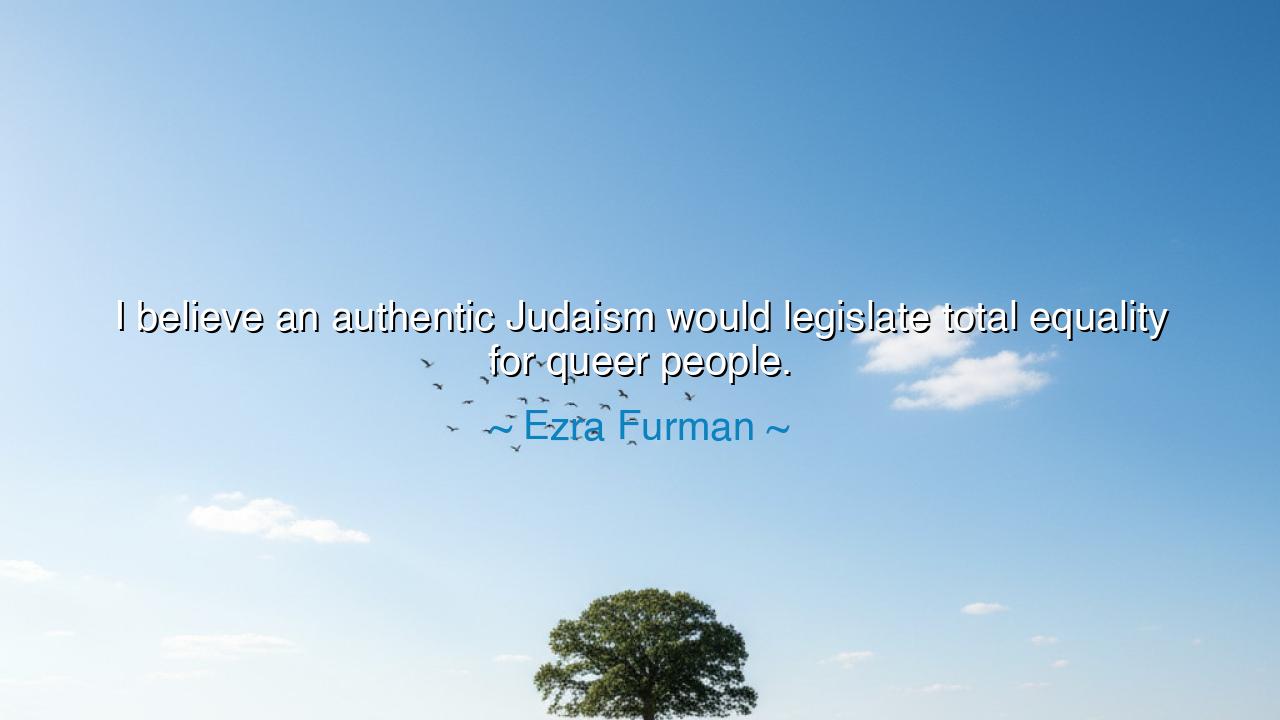
I believe an authentic Judaism would legislate total equality for






In the ancient scrolls of wisdom, the concept of equality was not a mere ideal but a sacred law woven into the fabric of the human experience. The words of Ezra Furman—"I believe an authentic Judaism would legislate total equality for queer people"—speak of a profound truth that resonates through the ages. It is a call for justice, a call to return to the deep roots of authenticity within a faith that is grounded not in exclusion, but in the universal dignity of all people. In these words, we hear a challenge to any system, be it religious or societal, that seeks to impose limitations on the inherent worth of individuals based on who they love, how they love, or the way they live.
From the earliest days of humanity, the call for equality has echoed through the hearts of those who sought truth and justice. In the ancient world, the concept of the sacred was often entwined with the very idea of human equality—that the divine created all people, regardless of their differences, with inherent worth. The Hebrew Bible, in its most authentic form, speaks to the heart of this truth. The prophets of Israel, from Isaiah to Amos, called out for a society that would uplift the oppressed, protect the marginalized, and ensure that justice and mercy flowed like a mighty river. To the ancient prophets, true faith was not about rituals alone but about action—about ensuring that the law of the land was a reflection of divine compassion and equity for all people.
In the heart of Judaism, there lies a principle that is often overlooked by those who seek to uphold its most rigid interpretations: that God's law is not just a set of commandments to be followed blindly but a living force meant to bring justice, freedom, and dignity to the human soul. To legislate equality for queer people is not a deviation from authentic Judaism, but a return to the true spirit of the faith—a faith that was always intended to be inclusive, that always sought to heal divisions and uplift those who were most in need. To deny queer people equality is to misinterpret the very essence of the faith.
Consider, for example, the example of King Josiah of Judah, who, in the 7th century BCE, rediscovered the Book of the Law during the renovation of the Temple and enacted sweeping reforms to bring justice and fairness back to his kingdom. Josiah's reforms were not just about religious ritual; they were about creating a society that reflected the divine laws of compassion and equality. His vision of a just society included protecting the poor, the widows, and the orphans, ensuring they had a voice in the decision-making process. This, too, is a reflection of what Ezra Furman calls for—a society where equality is not merely an ideal but a living, breathing reality, legislated for all, including queer people.
In our own time, the fight for queer equality has become one of the most pressing moral issues of our generation. Ezra Furman’s call resonates with the struggles of countless individuals throughout history who have fought for the right to live freely and authentically. Whether it is the struggle for same-sex marriage, the fight for transgender rights, or the demand for anti-discrimination laws, the movement for queer equality is, at its core, a call for justice. It is a fight to ensure that all people, regardless of their sexual orientation or gender identity, are given the same rights and protections as any other member of society. To truly honor the spirit of Judaism, as Furman suggests, is to recognize that authentic faith calls us to celebrate and affirm the diversity of human experience, not to limit it.
The lesson here is powerful and clear: equality is not a threat to the sacredness of any faith, but the very foundation upon which it stands. Authentic Judaism, like all true faiths, is about justice for all people, and that includes those who are often marginalized or excluded from society. To legislate total equality for queer people is not to depart from the faith but to return to its most sacred truths: love, compassion, and the recognition of the dignity of every individual. As you live your life, remember that true faith, whether in Judaism or in any other tradition, is not about adhering to rigid laws but about acting with love and justice in every decision you make.
In your own life, strive to embody the principles of equality that are at the heart of all sacred traditions. Fight for the dignity of every person, regardless of their identity or background, and work to ensure that the society you create is one where love and justice are not just ideals but realities. Whether you are part of a faith community or simply seeking to make the world a better place, let compassion and equality be the guiding lights that lead your way. For when we stand together in the pursuit of equality, we are not only honoring our faith but the very essence of our shared humanity.






AAdministratorAdministrator
Welcome, honored guests. Please leave a comment, we will respond soon